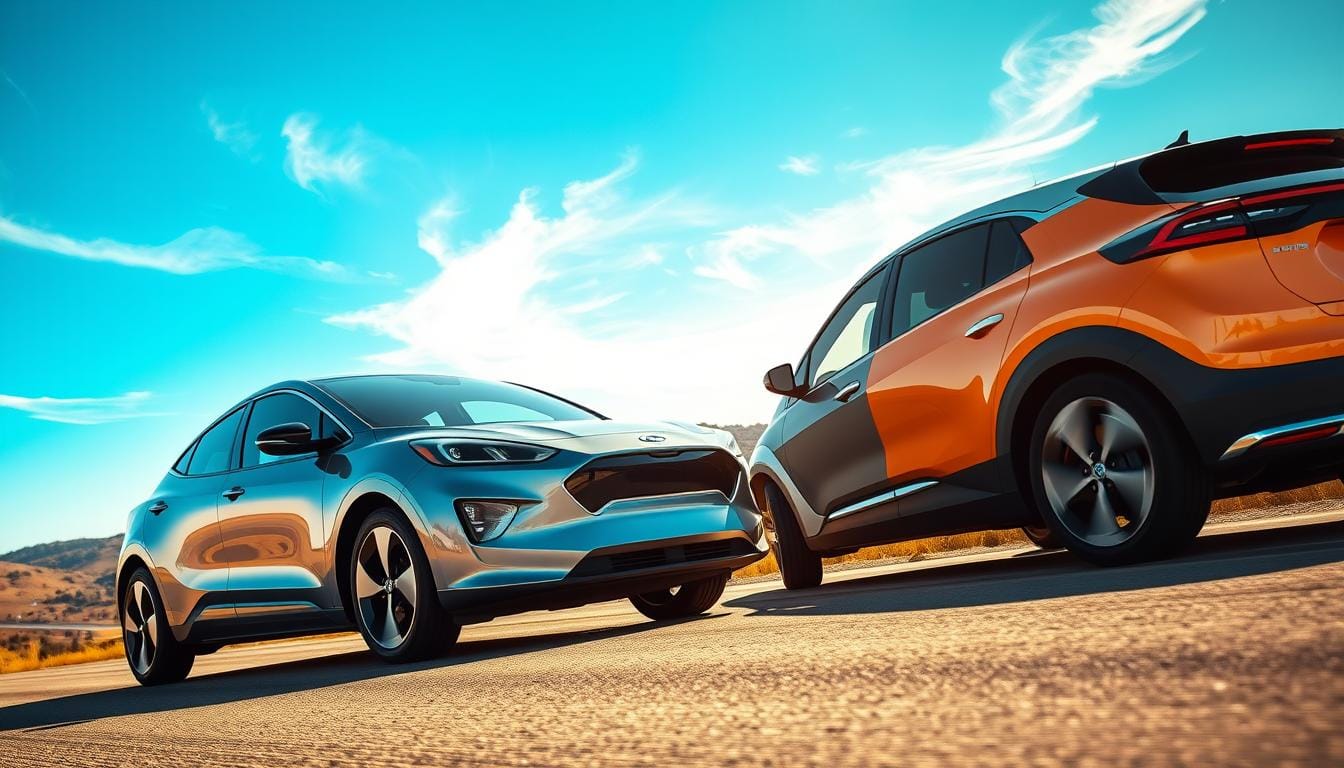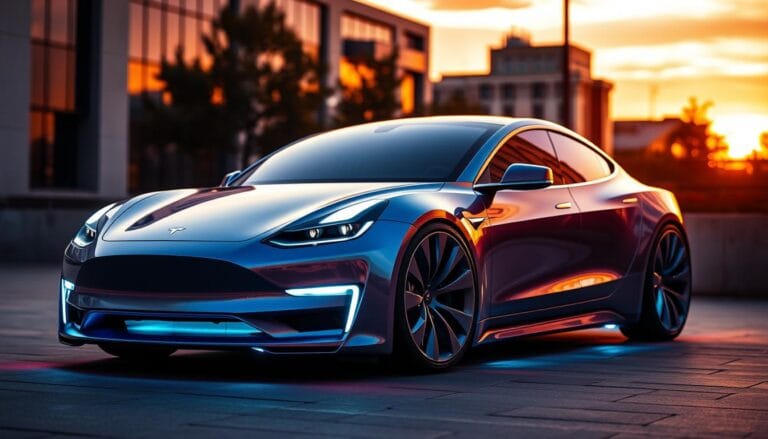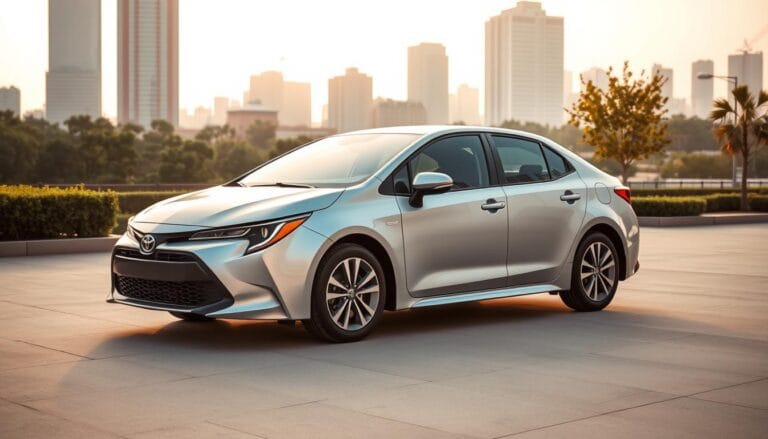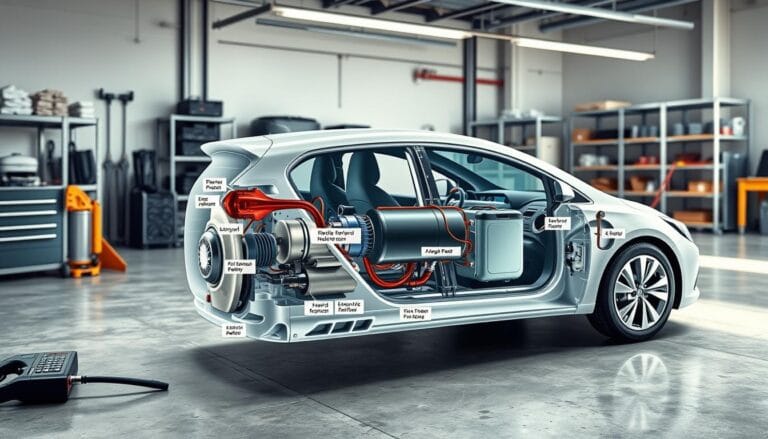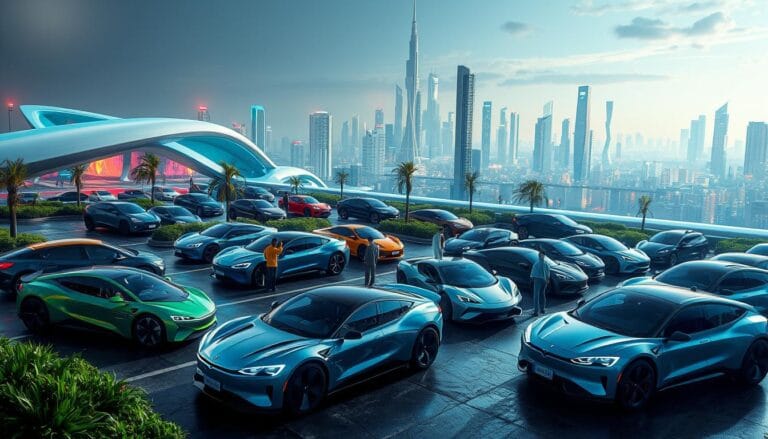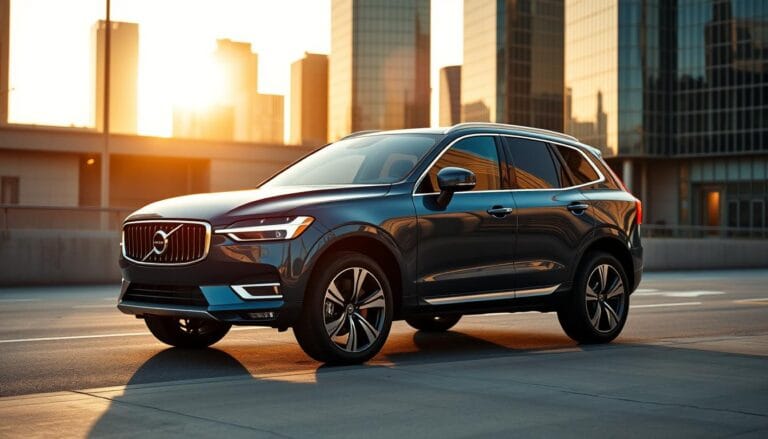Hybrid vs Electric Cars: Which Wins for 2025 Drivers?
Imagine standing at the crossroads of automotive innovation. Your next vehicle choice could change your driving experience and help the planet. Hybrid and electric vehicles are changing how we think about moving around.
In 2024, the car world saw a big change. Electric vehicle sales worldwide jumped to 16.7 million units, up 20% from last year. In the U.S., hybrid sales rose by 36.7%, making up 10.6% of all car sales. These numbers show a big shift happening.
Choosing between hybrid and electric cars is more important than ever. With new tech, green concerns, and money matters all coming together, picking the right car is a big deal. You need to think about how well it performs, its cost, and how green it is.
Table of Contents
Understanding the Basics of Hybrid and Electric Cars
As cars get smarter, you might wonder about hybrid and electric vehicles. The 2025 car market is full of new options that are good for the planet. Let’s explore how these modern cars are changing how we travel.
Today’s cars have advanced power systems that challenge old gas-guzzlers. Electric vehicles comparison shows how these techs work and their perks.
What is a Hybrid Car?
A hybrid car uses both a gasoline engine and an electric motor. These cars use less fuel by switching between power sources. The benefits include:
- Less fuel used
- Lower emissions than gas cars
- Can run on electricity at slow speeds
- Longer driving range
What is an Electric Car?
Electric vehicles (EVs) only use battery power, making no direct emissions. These cars are at the forefront of car tech. They stand out for:
- 100% electric power
- No tailpipe emissions
- Quiet and smooth ride
- Potential for lower costs
Key Differences Between Them
Knowing the differences helps you choose wisely. Hybrid cars offer flexibility with two power sources. Electric vehicles give a pure electric ride. Your choice depends on your driving, charging access, and what you like.
By 2024, electric vehicle sales have grown a lot. 381,970 new EVs were sold, and 167,178 plug-in hybrids were registered. This shows more people want cars that use alternative fuels.
Environmental Impact: Which is Greener?
It’s important to know how eco-friendly transportation affects our planet. Your choice of vehicle can change how we move and the environment around us.
Electric cars have changed how we think about green travel. They’re not just about what comes out of the tailpipe.
Emissions Comparison
Let’s look at the emissions debate:
- Electric vehicles (EVs) produce zero tailpipe emissions
- Hybrid vehicles generate lower emissions compared to traditional gas cars
- The electricity grid’s composition significantly influences EV environmental impact
Resource Usage and Sustainability
Looking at a vehicle’s whole life shows us more about sustainability:
| Vehicle Type | Manufacturing Impact | Operational Emissions | Long-Term Sustainability |
|---|---|---|---|
| Electric Vehicles | Higher initial carbon footprint | Zero direct emissions | Highly sustainable with renewable energy |
| Hybrid Vehicles | Lower manufacturing impact | Reduced but present emissions | Moderate sustainability |
Choosing eco-friendly transportation depends on many things. These include local energy, how you drive, and what you value most for the environment.
Cost of Ownership: Hybrid vs Electric
When looking at fuel-efficient cars, knowing the total cost is key. This helps you make a wise choice. Hybrid cars and electric vehicles have different costs that are worth considering.
Purchase Price Comparison
The cost to buy these cars varies a lot. Here are some current prices:
- Average hybrid vehicle sticker price: $42,500
- Average electric vehicle sticker price: $55,000
- Federal subsidies for EV purchases can reach up to $7,500
Maintenance Expenses
Maintenance costs are important when looking at hybrids. Electric cars usually cost less to maintain:
- Average annual maintenance cost for electric vehicles: $949
- Average annual maintenance cost for gas-powered vehicles: $1,279
- Electric vehicles don’t need oil changes or air filter replacements
Energy and Fuel Expenses
Your ongoing costs depend on how much you drive and local energy prices. Here are some interesting facts:
- Electric vehicle monthly payment average: $774
- Hybrid vehicle monthly payment average: $607
- Electric vehicles cost less per mile than traditional cars
Breaking even on your investment depends on many things. This includes the car’s size, range, and local incentives. Smaller EVs might break even in five years. But bigger cars might take longer.
Driving Experience: Performance Insights
Electric vehicles and hybrid cars are changing how we drive in 2025. They offer performance that goes beyond what we expected. When you look at electric vehicles, you enter a world of innovation that changes how we see driving.

The market analysis of hybrid electric vehicles shows exciting insights. Modern electric and hybrid cars have amazing acceleration and handling. They surprise even the most experienced drivers.
Acceleration and Handling
Electric vehicles give a unique driving experience with instant torque and smooth acceleration. Key features include:
- Zero to 60 mph in just 3-4 seconds
- Instant power without shifting gears
- Precise weight for better stability
- Lower center of gravity for better cornering
“Electric motors provide an unparalleled driving sensation – pure responsiveness and seamless power delivery.” – Automotive Performance Magazine
Noise Levels and Comfort
Electric and hybrid vehicles make driving quieter and more comfortable. They eliminate the noise of traditional engines. Most electric vehicles are as quiet as 60-70 decibels, compared to 80-90 decibels in gas cars.
In 2025, driving will be smooth, quiet, and technologically advanced. Every trip will be more enjoyable and relaxed.
Charging and Fueling: Convenience Factors
Electric car technology is getting better, and knowing how to charge and fuel them is key. The 2025 car market brings new challenges and chances for electric and hybrid car owners.
Choosing the right power setup for your car is important. The good and bad of hybrid cars show up when looking at charging and fueling options.
Charging Infrastructure in 2025
Charging electric cars has changed a lot. By 2025, drivers will find a wide network of charging spots. These spots will have fast charging:
- Public charging stations are growing in big cities
- Fast-charging networks will cover 90% of highways
- Charging times will drop to 20 minutes for an 80% charge
Refueling Hybrid Cars: How Does It Work?
Hybrid cars offer a special benefit. They mix a gasoline engine with an electric motor. This gives drivers more options:
- Gasoline can be refueled at regular gas stations
- Electric parts recharge when you brake
- Some models can be plugged in for more electric driving
Electric cars now make up 21% of new car sales. This shows more people trust in new fuel options. Tax credits of $2,500 to $7,500 help make these cars more affordable.
Range Anxiety: Comparing Driving Distances
When looking at hybrid vs electric cars, range is key. Knowing how far different cars can go helps you choose wisely.
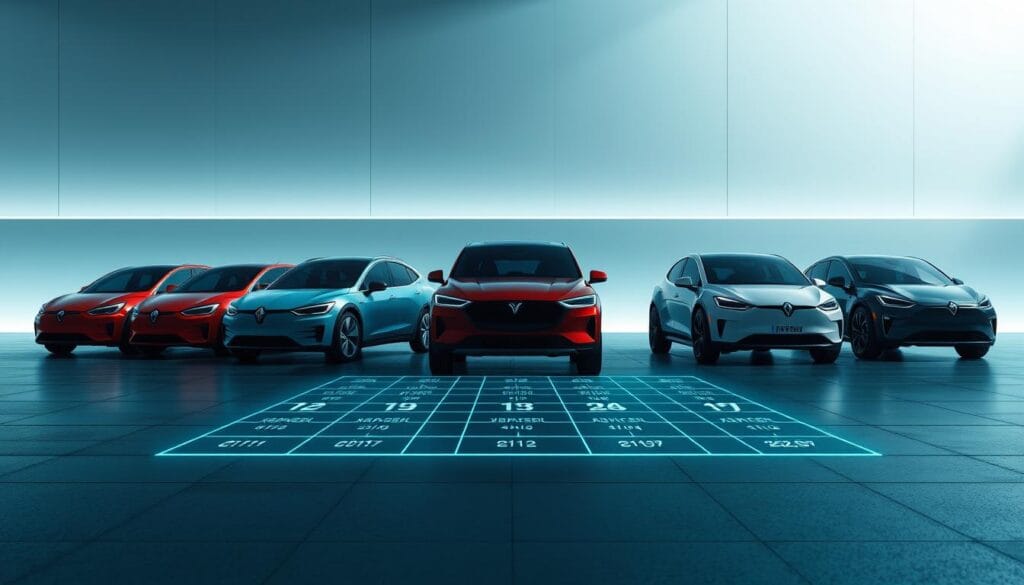
Range anxiety is the fear of running out of power on a trip. Luckily, both electric and hybrid cars have improved a lot.
Typical Range for Hybrids
Hybrids are great for long trips. The Toyota RAV4 Hybrid can go about 580 miles on a tank. This makes it perfect for long drives.
- They use both electric and gasoline power.
- They can go far without needing to refuel.
- Refueling is less often needed.
Typical Range for Electric Vehicles
Electric cars can now go very far on one charge. Here are some top models:
- Lucid Air: 516 miles
- Tesla Model S: 405 miles
- Hyundai IONIQ 5: 303 miles
Most people drive under 30 miles a day. This makes electric cars more practical. Electric vehicles comparison shows less range anxiety with better batteries.
The car industry keeps working on batteries to improve range and energy.
When picking between hybrids and electric cars, think about your driving habits. Also, consider charging options and how far you need to go.
Incentives and Rebates: Saving Money
Exploring fuel-efficient cars in 2025 can save you money. The government offers big incentives to help you choose greener cars. This makes buying an eco-friendly vehicle more affordable than before.
Federal Incentives for Electric Vehicles
The federal government has great financial benefits for electric vehicle buyers. Here are some key points:
- Full tax credit of $7,500 for eligible electric vehicles in 2025
- MSRP limits: $80,000 for SUVs, $55,000 for sedans
- Partial credits available for plug-in hybrid electric vehicles
State-Level Incentives for Green Vehicles
State rebates can also cut down your costs on benefits of hybrid cars. For example:
- Pennsylvania offers $2,000 for new battery electric cars
- New Jersey provides up to $4,000 in electric vehicle rebates
- Low-income households may qualify for additional incentives
Choosing an electric or hybrid vehicle is smart. It’s good for the environment and your wallet.
There’s more to saving money than just the initial incentives. Think about the long-term savings on fuel and maintenance. These green cars offer big benefits over time.
Technology Features: Innovations in 2025
The world of electric cars is changing fast, with new tech in hybrid and electric vehicles. In 2025, we’ll see big changes that will change how we drive and use our cars.
Advancements in Electric Vehicle Tech
Electric car tech is getting better fast. We’re seeing:
- Bigger battery packs for longer drives
- Quicker charging times
- Better energy use for better car performance
Hybrid cars are also getting smarter. They can get updates online, making them better without a trip to the dealer.
Smart Features in Hybrid Models
Hybrid cars are getting smarter too. They come with new tech that makes driving safer and more fun.
| Technology Feature | Electric Vehicles | Hybrid Vehicles |
|---|---|---|
| Smart Energy Management | AI-powered range optimization | Intelligent power switching |
| Connectivity | Full smartphone integration | Adaptive navigation systems |
| Autonomous Capabilities | Level 3 self-driving | Advanced driver assistance |
By 2025, electric and hybrid cars will be more advanced than ever. They’ll make driving smarter, more efficient, and connected.
Resale Value and Depreciation Rates
When looking at hybrid vs electric cars, knowing how they hold their value is key. The car market gives us interesting views on how these new cars keep their worth over time.
The depreciation picture for hybrid and electric cars is complex. Recent studies show big differences in how much value these cars keep.
Electric Car Value Retention Insights
Electric vehicles have different ways of losing value. Key points include:
- 16 out of 20 car models saw price drops compared to traditional ICE vehicles
- Only 4 EVs kept up with gas-powered cars in value
- Some notable depreciation rates:
| Vehicle Model | Depreciation Rate |
|---|---|
| Toyota bZ4X | 29% value loss |
| Ford F-150 Lightning | 25.8% price drop |
| Nissan Ariya | 19.2% depreciation |
Hybrid Cars: A Comparative Analysis
Hybrid cars tend to hold their value better. Toyota Prius is a standout with a 5-year residual value of 68.92%. The 2025 Toyota Camry hybrid also keeps a high value at 65.09% after five years.
Factors that affect resale value include:
- Better battery technology
- More charging stations
- Longer manufacturer warranties
- Higher demand for green cars
Choosing between hybrid and electric cars should take these depreciation trends into account. Electric cars tend to lose more value, but hybrid cars keep their value more consistently.
Conclusion: Choosing the Right Option for You
Choosing the right eco-friendly transportation is important. Electric vehicles and hybrid cars have their own benefits. Your choice depends on your driving habits, local options, and what you value most.
Electric vehicles are great for city drivers with easy access to charging. Now, EVs can go up to 400 miles on a single charge. They’re good for the planet and save money in the long run.
Hybrid cars are a good choice for those who need flexibility. They use less fuel than gas cars and go further. They’re also cheaper upfront and easy to refuel, making them perfect for varied driving needs.
The future of cars is exciting. New tech, more charging spots, and government help will make electric and hybrid cars even better. Think about what’s best for you, the planet, and your wallet when picking your next car.
FAQ
What’s the main difference between hybrid and electric cars?
Are electric cars really better for the environment?
How much does it cost to charge an electric car compared to fueling a hybrid?
What’s the main difference between hybrid and electric cars?
Are electric cars really better for the environment?
How much does it cost to charge an electric car compared to fueling a hybrid?
FAQ
What’s the main difference between hybrid and electric cars?
Hybrid cars use both a gasoline engine and an electric motor. Electric cars run only on battery power. Hybrids offer flexibility with two power sources, while EVs rely on electrical charging.
Are electric cars really better for the environment?
It depends on the electricity source. EVs have zero tailpipe emissions. But, their environmental impact also depends on how the electricity is made. Renewable energy makes electric cars much greener than hybrids or gasoline cars.
How much does it cost to charge an electric car compared to fueling a hybrid?
Charging an electric car is usually cheaper than fueling a hybrid. Electricity costs are often lower and more stable than gasoline prices. This can save you 0-
FAQ
What’s the main difference between hybrid and electric cars?
Hybrid cars use both a gasoline engine and an electric motor. Electric cars run only on battery power. Hybrids offer flexibility with two power sources, while EVs rely on electrical charging.
Are electric cars really better for the environment?
It depends on the electricity source. EVs have zero tailpipe emissions. But, their environmental impact also depends on how the electricity is made. Renewable energy makes electric cars much greener than hybrids or gasoline cars.
How much does it cost to charge an electric car compared to fueling a hybrid?
Charging an electric car is usually cheaper than fueling a hybrid. Electricity costs are often lower and more stable than gasoline prices. This can save you $500-$1,000 a year in fuel costs.
What’s the typical driving range for electric vehicles in 2025?
Most electric vehicles now have ranges of 250-400 miles on a single charge. Some premium models can go up to 500 miles. Advances in battery technology are helping to increase these ranges.
Are there government incentives for buying hybrid or electric cars?
Yes, there are incentives from federal and state governments. Electric vehicles can get up to $7,500 in tax credits federally. Hybrid vehicles may get smaller incentives, depending on the model and state rules.
How long does it take to charge an electric car?
Charging times vary. Level 1 charging (standard home outlet) takes 20-24 hours. Level 2 chargers need 4-10 hours. Fast-charging stations can charge an 80% battery in 30-45 minutes.
Do electric cars perform as well as traditional vehicles?
Electric vehicles often perform better than traditional cars in acceleration. They have instant torque, smooth, quiet acceleration, and excellent handling. This is due to battery placement and weight distribution.
What’s the maintenance cost difference between hybrid and electric cars?
Electric vehicles have lower maintenance costs because they have fewer moving parts. They don’t need oil changes and have simpler transmissions. Hybrid cars have slightly higher maintenance needs but are less expensive than traditional gasoline vehicles.
How do extreme temperatures affect electric vehicle performance?
Extreme temperatures can affect battery efficiency. Cold weather can reduce range by 10-40%. Very hot conditions can also impact battery performance. Modern EVs have advanced thermal management systems to help with these effects.
What should I consider when choosing between a hybrid and electric car?
Think about your driving habits, local charging infrastructure, daily driving distance, budget, and environmental priorities. Also, consider access to charging stations. Each technology has unique advantages based on individual needs and local conditions.
,000 a year in fuel costs.
What’s the typical driving range for electric vehicles in 2025?
Most electric vehicles now have ranges of 250-400 miles on a single charge. Some premium models can go up to 500 miles. Advances in battery technology are helping to increase these ranges.
Are there government incentives for buying hybrid or electric cars?
Yes, there are incentives from federal and state governments. Electric vehicles can get up to ,500 in tax credits federally. Hybrid vehicles may get smaller incentives, depending on the model and state rules.
How long does it take to charge an electric car?
Charging times vary. Level 1 charging (standard home outlet) takes 20-24 hours. Level 2 chargers need 4-10 hours. Fast-charging stations can charge an 80% battery in 30-45 minutes.
Do electric cars perform as well as traditional vehicles?
Electric vehicles often perform better than traditional cars in acceleration. They have instant torque, smooth, quiet acceleration, and excellent handling. This is due to battery placement and weight distribution.
What’s the maintenance cost difference between hybrid and electric cars?
Electric vehicles have lower maintenance costs because they have fewer moving parts. They don’t need oil changes and have simpler transmissions. Hybrid cars have slightly higher maintenance needs but are less expensive than traditional gasoline vehicles.
How do extreme temperatures affect electric vehicle performance?
Extreme temperatures can affect battery efficiency. Cold weather can reduce range by 10-40%. Very hot conditions can also impact battery performance. Modern EVs have advanced thermal management systems to help with these effects.
What should I consider when choosing between a hybrid and electric car?
Think about your driving habits, local charging infrastructure, daily driving distance, budget, and environmental priorities. Also, consider access to charging stations. Each technology has unique advantages based on individual needs and local conditions.

